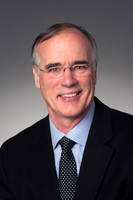
Dr. Bernard Brady
A central theme in the life and teaching of Pope Francis is the promotion of dialogue, the promotion of what he calls “a culture of encounter.” He is not subtle about this. Indeed, in a homily to the Brazilian bishops, he said, “I would like you to be almost obsessed about this.” Pope Francis believes that a culture of encounter can bring together “people of every condition and belief, like a net of peace” to promote a “just, responsive, and inclusive society.” The point of dialogue is not to develop a superficial or simplistic syncretism. He writes, “True openness involves remaining steadfast in one’s deepest convictions, clear and joyful in one’s own identity, while at the same time being open to understanding those of the other party and knowing that dialogue can enrich each side.” His words about peace and social dialogue, which he calls a “great issue . . . fundamental at this time in history” that “will shape the future of humanity” is “inspired by Catholic intellectual tradition” (to quote a mission statement from a great Catholic university).
Dialogue in Catholic intellectual tradition has been characterized by two complementary impulses: convergence and contrast (see the Pontifical Biblical Commission on The Bible and Morality). From its biblical roots, the tradition has recognized that “wisdom, as a human virtue, [is] potentially discoverable in all cultures.” When St. Paul, for example, in his letter to the Galatians (ch. 5), lists the vices and virtues, he is affirming the best of the community he is evangelizing. Great thinkers in the tradition followed Paul’s lead. St. Clement of Alexandria in the second and third centuries made use of the work of the first-century Jewish philosopher, Philo. St. Augustine, in the fourth century, relied on the classical Greek philosopher, Plato. St. Thomas Aquinas in the thirteenth century famously rested his theology on “The Philosopher”: Aristotle. Indeed, in our own time, St. John Paul II was significantly influenced by Max Scheler, a German philosopher, on whom he wrote a dissertation.
The recognized scholar of Aquinas, Servais Pinchaers, writes, “The work of St. Thomas ... constitutes the convergence of all the great currents of thought known in the thirteenth century, meeting in the cultural center represented by the University of Paris, in their full theological and philosophical flowering. It should be noted, however, that these currents not only exert a historical influence upon Thomas but, with the contribution of revelation and the different traditions, they provide him with solid materials for a construction at once faithful and original.”
Thus it is with the Catholic intellectual tradition in the twenty-first century at “the cultural center” represented by the University of St. Thomas. We promote encounter. We promote dialogue. We affirm the human virtue of wisdom, and we foster the “full flowering” of academic disciplines, in the words of Pope Francis, “without being presumptuous, imposing ‘our truths,’ but rather be[ing] guided by the humble yet joyful certainty of those who have been found, touched, and transformed by the Truth who is Christ, ever to be proclaimed.”
The Theology Department creates a culture of encounter in a variety of ways, the most significant being the “bridge courses” that are offered at the 400-level. Dr. Anthony’s course “brings a theological viewpoint to bear on significant environmental challenges such as climate change and biodiversity loss,” and is featured in this issue. Other bridge courses that are running this semester include Dr. Bushlack’s course on theology and politics, which “considers how Christians can best engage in liberal, democratic political systems in a way that respects the reality of pluralism while also remaining true to the central moral claims of the Christian tradition.” Dr. Myers’ course on women in the early church “focuses on gender in communities both historical and contemporary.” Dr. Schlabach’s course on theologies of justice and peace examines “at least five different religions or worldviews and what they have to say about human struggles to create just and peaceful societies.” Dr. Vrudny’s course in theology and beauty “offers students an opportunity to explore vocation, understood to be where the deepest yearnings of one’s heart meet the deepest needs of the world, as they consider what it is to live beautifully.”
We create a culture of encounter outside of the classroom was well. Our Theology Night Live series is aimed to bring students together (enticed by pizza) to discuss theological ideas. The Theology Department also sponsors public lectures, a few of which are highlighted in this issue. Our national conference on the 50th Anniversary of Gaudium et Spes will also promote dialogue. We hope you enjoy the issue, and that it draws you into our work.
From “theology matters,” a newsletter of the Department of Theology. Subscribe here.






